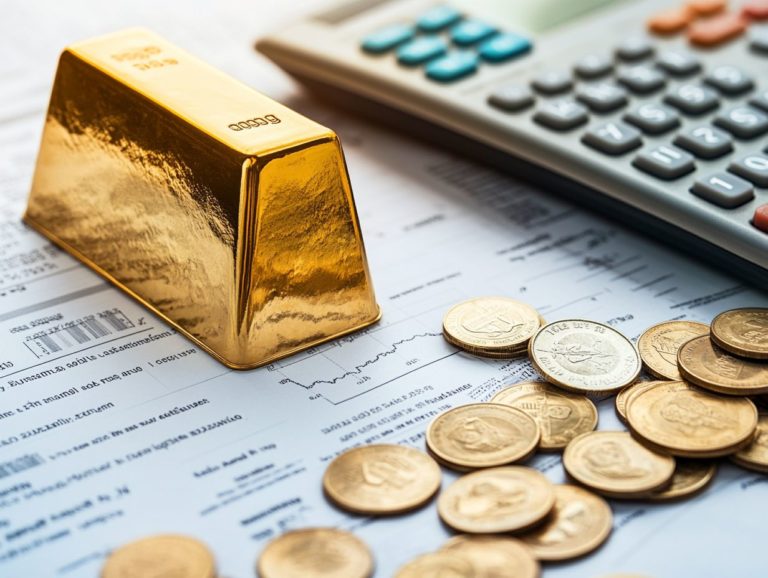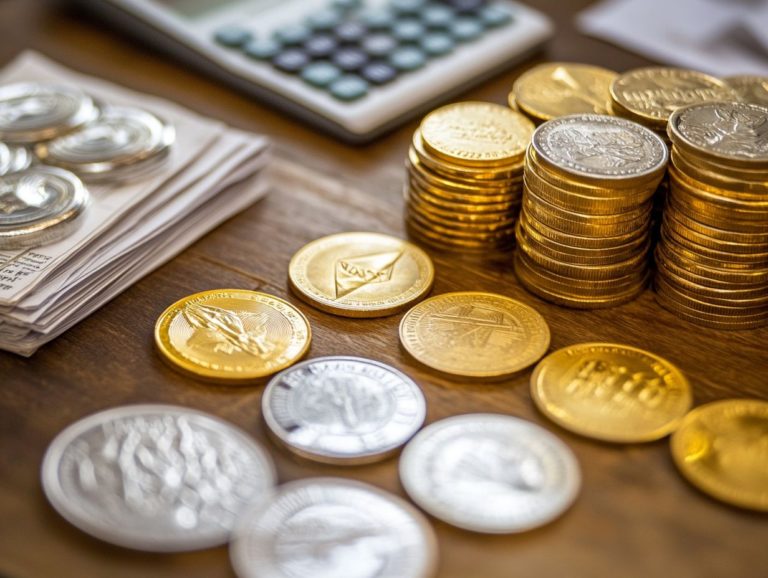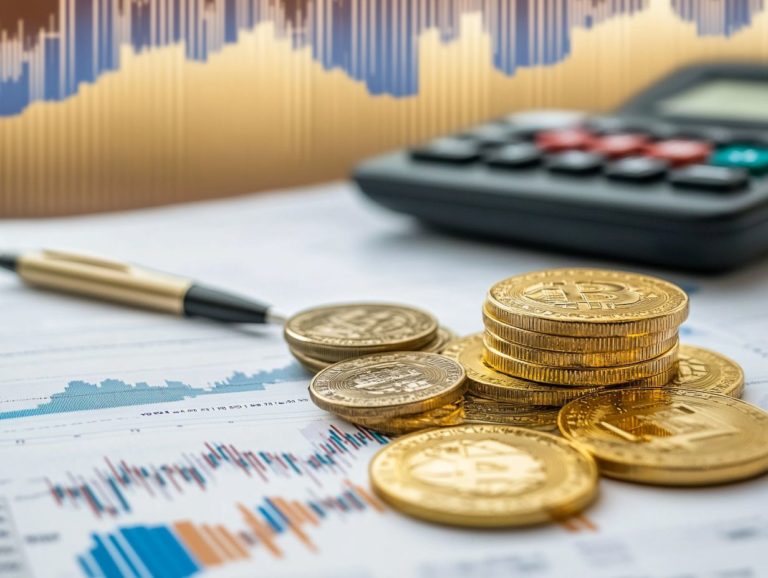How to Assess Tax Liabilities for Precious Metals Sales
Navigating the realm of precious metals sales can be incredibly rewarding. However, it brings along its own set of tax responsibilities that you need to be aware of. Don t let tax surprises catch you off guard!
Understanding the taxes you owe is essential if you re looking to sell gold, silver, or other metals. This guide will help you uncover everything you need to know about taxes on your precious metal sales. We ll cover what these taxes entail, why they apply, and the various factors that influence how much you ultimately owe.
We ll also outline effective strategies to minimize your tax burden. You ll find clear guidance on how to accurately report these sales on your tax returns. Whether you re a seasoned investor or just starting out, this information will empower you to make informed decisions.
Contents
- Key Takeaways:
- What You Need to Know About Taxes on Precious Metals Sales
- Factors that Affect Tax Liabilities
- Calculating Tax Liabilities
- Minimizing Tax Liabilities
- Reporting Tax Liabilities
- Frequently Asked Questions
- What is the tax rate for selling precious metals?
- Do I have to pay taxes on all types of precious metals?
- How do I determine the fair market value of my precious metal holdings?
- Are there any deductions or exemptions for taxes on precious metals sales?
- Do I have to pay taxes if I give my precious metals as a gift?
- What if I have losses from selling my precious metals?
Key Takeaways:
- Understand that precious metals sales incur taxes based on profits.
- Recognize that the type of metal, how long you ve owned it, and whether you made a profit or loss influence your tax obligations.
- Minimize your tax liabilities by considering tax rates and utilizing different sales strategies.
What You Need to Know About Taxes on Precious Metals Sales
Knowing your taxes when selling precious metals like gold, silver, and platinum is essential for optimizing your investment portfolio.
When you sell these assets, you encounter various tax implications, primarily a tax on the profit you make when selling an asset. This tax can be classified as either short-term or long-term, depending on how long you ve held the asset.
The IRS requires you to follow specific reporting rules to avoid unexpected tax burdens.
State laws may also impose their own capital gains tax rates and exemptions, making it crucial to stay informed and proactive in your tax strategy.
What are Tax Liabilities?
Tax liabilities represent your legal obligation to pay taxes, arising from various sources like income tax and capital gains.
Your obligation can fluctuate significantly based on your income level, the type of income you earn, and any specific deductions or credits available to you.
For example, if you’re earning wages, you’re required to pay federal income tax. If you sell stocks at a profit, you will incur capital gains tax on that profit. Capital gains can be categorized as short-term or long-term, which directly affects the tax rate applied.
Short-term gains typically from assets held for less than a year are taxed as ordinary income. Long-term gains benefit from favorable reduced rates.
Understanding how these taxes interconnect and their reporting requirements is essential for your effective financial planning.
Why are Precious Metals Sales Taxable?
Sales of precious metals, such as gold and silver, are taxable events under IRS regulations. This can result in capital gains for you as an investor.
When you buy or sell these assets, any profits may be subject to capital gains tax. The IRS treats precious metals, including coins and bullion (items like coins and bullion that can be taxed at a higher rate), as collectibles. Understanding the role of precious metals in your tax strategy can help you navigate the potential higher tax rates compared to standard investments.
This classification means gains from the sale of such metals can be taxed at a maximum rate of 28%, regardless of how long you held them. However, there may be exemptions under specific circumstances, particularly if you ve invested in certain retirement accounts.
Understanding these tax implications is vital for ensuring compliance and maximizing your potential returns.
Factors that Affect Tax Liabilities
Various factors influence taxes when selling precious metals. Consider the type of metal you re dealing with, the duration of your ownership, and the profit or loss generated from the transaction.
Each of these elements plays a crucial role in determining the applicable tax rate.
Type of Precious Metal
The type of precious metal you re selling whether it s gold, silver, platinum, or palladium can significantly impact the tax rate applied to any capital gains realized from the sale.
This variation stems from how the IRS classifies each metal, especially regarding collectibles, which are items valued due to rarity or demand and may be taxed differently. For example, while gold and silver bullion are often investments, they might be subject to a collectibles tax rate of 28% if sold at a profit after holding for a year. In contrast, platinum and palladium typically don’t fall into this same classification, which means you could enjoy a more favorable long-term capital gains tax rate of 15% or 20% if you’re in a higher income bracket. To maximize your returns, consider exploring tax strategies for maximizing returns in precious metals.
Understanding these classifications is crucial, as they can dramatically influence your tax obligations. Grasp these nuances before you decide to liquidate your assets!
Duration of Ownership
The duration of your ownership, or holding period, is pivotal in determining whether your gains from selling precious metals are classified as long-term or short-term capital gains.
Your choices as an investor significantly impact your tax liabilities. The IRS makes a clear distinction between these two categories. Short-term capital gains, arising from assets held for a year or less, are taxed at ordinary income tax rates which can be steep based on your income bracket. On the other hand, long-term capital gains benefit from reduced tax rates. It s vital to consider how long you hold your investments.
To optimize your overall tax situation, explore strategies like buy-and-hold approaches or diversifying your holdings to extend the holding period before selling.
Profit or Loss from Sale
The profit or loss from the sale of precious metals plays a crucial role in determining your tax liabilities, as it directly impacts the taxable event and how losses can offset gains.
Understanding how to calculate these figures is essential for you as an investor navigating the complex landscape of tax implications. First, determine your cost basis, which is the amount you paid for the metal plus any related costs like commissions and fees. This figure is vital when calculating gains or losses during a sale, especially when considering the tax impact of precious metals in your financial strategy.
If you experience a loss, strategically leverage tax deductions to decrease your overall taxable income. You can carry those losses forward into future tax years. By offsetting losses against any realized gains, you can potentially minimize your tax liabilities. Keep your records organized to maximize your savings!
Calculating Tax Liabilities
Calculating the tax liabilities associated with your sale of precious metals requires a nuanced understanding of the relevant tax rates, the formulas for capital gains calculations, and the potential application of sales tax in specific jurisdictions.
By mastering these factors, you can navigate the complexities of taxation with confidence and ensure compliance.
Tax Rates and Formulas
Understanding tax rates and the formulas for calculating capital gains is crucial for accurately assessing your potential tax liabilities when selling precious metals.
- Short-term capital gains are taxed at your ordinary income tax rate.
- Long-term gains, which come from assets held for over a year, benefit from reduced tax rates that can range from 0% to 20%.
The IRS provides clear guidelines for calculating these gains, such as subtracting the asset’s basis from the selling price. By incorporating these calculations into your tax planning strategies, you can optimize the timing of your sales, explore potential deductions, and ultimately reduce your tax burden.
Are you ready to take control of your tax situation with your precious metals?
Considerations for Different Types of Sales
When selling precious metals, many factors matter. These include potential sales tax implications and the nature of the sale.
Understanding the differences between private sales and dealer transactions is crucial. Private sales offer pricing flexibility but come under closer scrutiny from tax authorities.
In contrast, dealer sales simplify the process but may include additional regulatory requirements. The IRS mandates reporting earnings from these sales, which affects your tax liabilities.
By understanding these sales scenarios, you can make informed choices. This helps optimize your financial outcomes and comply with IRS regulations.
Minimizing Tax Liabilities
You can minimize tax liabilities on precious metals sales with various strategic approaches. Leveraging tax deductions and reinvesting profits can help defer taxes.
Donating to charitable organizations can also offset gains. Exploring these options allows you to enhance your financial outcomes while managing tax obligations.
Strategies for Reducing Taxes on Precious Metals Sales
Implementing effective investment strategies can significantly reduce taxes. Consider using sales tax exemptions and offsetting losses to your advantage.
Timing your sales for favorable tax rates is essential. If you wait until a year when your income is lower, you may fall into a lower tax bracket, resulting in less tax on your profits.
Selling underperforming assets can decrease your taxable income. It’s smart to look into states with no sales tax on precious metals for additional savings.
These tactics can enhance your returns and maximize your investments.
Reporting Tax Liabilities
Accurate reporting of tax liabilities to the IRS is essential for investors in precious metals. Ignoring this responsibility could lead to penalties and increased scrutiny from tax authorities.
How to Report Precious Metals Sales on Tax Returns
Reporting precious metals sales on your tax returns requires specific information from the IRS. You’ll need to disclose capital gains and any investment gains from your transactions.
First, gather essential data: purchase price, sale price, and transaction dates. This information helps calculate your capital gains, which are the difference between your selling price and the purchase cost.
Once you have these numbers, report them on Schedule D of Form 1040. Remember, tax deadlines typically fall on April 15, so stay mindful of them.
Different states may have their own regulations on the taxation of precious metals. Staying informed can save you from surprises.
Frequently Asked Questions
What is the tax rate for selling precious metals?
The tax rate varies by metal type and how long you held it. Short-term gains (held less than a year) face your ordinary tax rate, while long-term gains (held over a year) are taxed at a lower rate.
Do I have to pay taxes on all types of precious metals?
No, not all precious metals are taxed upon sale. Gold, silver, platinum, and palladium are collectibles and taxed differently. However, bullion coins and bars have unique tax rules, and some exemptions may apply.
How do I determine the fair market value of my precious metal holdings?
You can find the fair market value of your precious metal holdings by checking the current market price. This information is available online or through a trusted dealer. Remember, the value can change over time, so consulting a professional for an accurate assessment is a smart move.
Are there any deductions or exemptions for taxes on precious metals sales?
Yes, certain deductions and exemptions may apply when selling precious metals. For example, selling gold coins bought through a retirement plan, like a self-directed IRA, can postpone the taxes until you withdraw funds from the account.
Do I have to pay taxes if I give my precious metals as a gift?
Giving precious metals can be a generous gift! Be aware of potential tax implications for both you and the recipient. The giver may face gift tax, while the recipient might owe taxes based on the fair market value at the time of the gift.
What if I have losses from selling my precious metals?
If you incur losses from selling your precious metals, you might be able to deduct these from your overall income. There are specific rules for claiming these losses, so it s wise to consult a tax professional for tailored advice.













